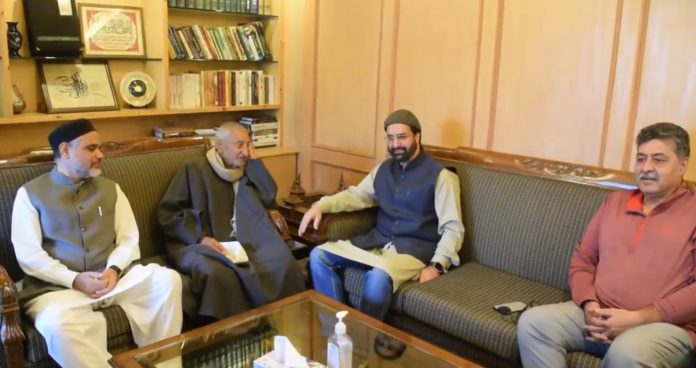SRINAGAR: Chairman Hurriyat Conference, Mirwaiz Umar Farooq’s visit to Delhi has ignited fresh speculation about potential backchannel talks between the Centre and the BJP, especially following concerns over the proposed Waqf (Amendment) Bill.
The religious leader, heading the Mutahida Majlis-E-Ulema (MMU), is set to meet the chairman of the joint committee examining the bill, Jagdambika Pal, to discuss the concerns surrounding the amendments.
According to Srinagar based news gathering agency Kashmir Dot Com, the visit, his first outside the Valley since the abrogation of Article 370 in 2019, has sparked speculation about potential backchannel engagements with the ruling BJP.
According to a report published in a national daily, a few days ago, the Narendra Modi-led government is considering reinitiating peace talks with the Hurriyat Conference after years of a deadlock.
The report suggest the Centre’s willingness to “enlarge the constituency of peace” stems from a perceived “change of heart” within the Hurriyat leadership and its realization of the “futility of confrontation.”
Quoting a senior BJP leader, who spoke on condition of anonymity, a national Newspaper report indicated that the government is exploring avenues to provide political space to moderate separatists like the Mirwaiz.
The leader in the report also pointed to a recent statement by Hurriyat member Prof. Abdul Gani Bhat, who called the separatist movement “directionless” and harmful to J&K’s people, as indicative of a shifting mindset among separatist ranks.
The Centre, according to political analysts quoted by the newspaper, sees an opportunity to bridge divides by engaging the Mirwaiz in dialogue, particularly given his consistent advocacy for peaceful resolutions. The Modi government, despite its hardline policies post-2019, appears to be considering a calibrated approach to address lingering discontent in Kashmir.
While political speculations dominate discussions, the immediate focus of Mirwaiz’s visit is the Waqf (Amendment) Bill. The Mutahida Majlis-E-Ulema (MMU), led by the Mirwaiz, has expressed deep reservations about provisions of the Bill, fearing adverse impacts on the autonomy of Waqf properties and their intended purpose of aiding underprivileged Muslim communities.
The MMU, representing Islamic organizations, Ulemas, and academic institutions across Jammu and Kashmir, highlighted concerns in a letter to Pal. The letter criticized proposed amendments that grant collectors sweeping powers over Waqf properties, reduce Muslim representation in Waqf boards, and allow for government intervention that could undermine the essence of the Waqf Act.
“The proposed changes threaten the autonomy and purpose of Waqf properties, creating widespread distress and apprehension among Muslims in J&K,” the letter said.
The Mirwaiz’s delegation seeks meaningful dialogue to address these concerns, stressing that unilateral actions could exacerbate communal insecurities and lead to litigation over religious properties.
Adding a layer of intrigue, political observers as per Kashmir Dot Com believe the Waqf Bill discussions could serve as a pretext for broader engagement between the Mirwaiz and BJP-affiliated leaders.
The timing of the visit, coupled with reports of backchannel communications, suggests the Centre might be testing waters for a more substantial dialogue process.
The Mirwaiz, known for his moderate stance and previous participation in talks under Atal Bihari Vajpayee’s leadership, could be a pivotal figure in any renewed engagement. Vajpayee’s mantra of “Insaniyat, Jamhooriyat, and Kashmiriyat” had resonated with Kashmiri leaders, including the Hurriyat, during his tenure. (KDC)





